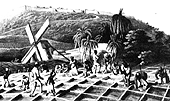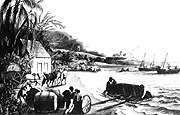|
Napoleon
The importance of sugar products in this region owes a lot
to Napoleon. In the eighteenth century England had seized
most of the West Indies islands, and had a lucrative trade
bring cane sugar across the Atlantic - and re-exporting it
to the Continent.
Sugar smuggling
During the long wars between England and France after the
French Revolution, Napoleon tried to crush England by
ruining its trade and industries - a policy called the
"Continental Blockade".
The French Navy tried to sink English
merchant ships, and there were heavy fines for
smugglers.
|

The sugar beet plant - was
originally grown to feed the leaves to cattle. Prussian
scientists discovered how to extract sugar from the beet
root.
|
The state built new factories to extract
the sugar - so a new industry was born.
An important crop
Today more sugar is made from beet than cane. It is an
important crop in Europe, especially around Cambrai. In
north France, you can often smell sugar beet processing
plants working flat out in the autumn.
Revival
In recent years, craft producers have revived popular 19th
century confectionery favourites. Many towns have a
speciality sweet, that is sold to tourists as a
souvenir.
|
|
 
Huge fortunes were made
growing sugar in the West Indies and shipping it to Europe -
Napoleon hoped to cripple Britain by developing an
alternative supply.
1.
Slaves plant cane on a
plantation; the windmill crushes the cane, and the fort on
the hill guards the slaves who outnumber owners. French
planters had slaves too, in Haiti and Guadeloupe.
2.
Shipping sugar and barrels
of molasses to England. The ships would return via Africa
with more slaves.
|



